- Human memory and great opportunities for its enhancement
- What you should know about how the human brain operates
- How to improve your memory—the right diet will boost your chances!
- What are some foods that improve memory and help your brain function well?
- The best vitamins for your brain
- Five basic rules to remember about nutrition for your brain
- Best foods to improve memory and boost your brain power
- Brain food for studying and exams
- Five simple tips on what to eat before an exam and how to improve working memory
Human memory and great opportunities for its enhancement
If you work with large amounts of information and have to remember a lot of facts, theories, and words, you probably spend a ton of time memorizing and revising this information. And you’re probably wishing that you knew how to improve your memory and make the most of your time.
We know that students often experience memory problems as they struggle to work on many tasks and assignments simultaneously. It’s a simple fact that a great memory is essential to student success.
Memory is a remarkable and unique ability of the human mind. We can store an immense amount of information and recall it—often instantly—whenever we need it.
The capacity of human memory is around 1 petabyte. It’s difficult to believe this, because 20 petabytes is the approximate amount of information Google processes each day.
Once you learn how to improve memory, you’ll encounter better opportunities for both your studies and career.
How?
You’ll be able to pick up foreign languages more easily and quickly, your exam preparation will be less stressful and more effective, and your coveted result will become that much more achievable.
These are the perfect reasons to learn a few simple tricks to know how to improve your memory and concentration. You can learn even more about this topic by checking out college essay examples discussing different aspects of human brain and ist functions.
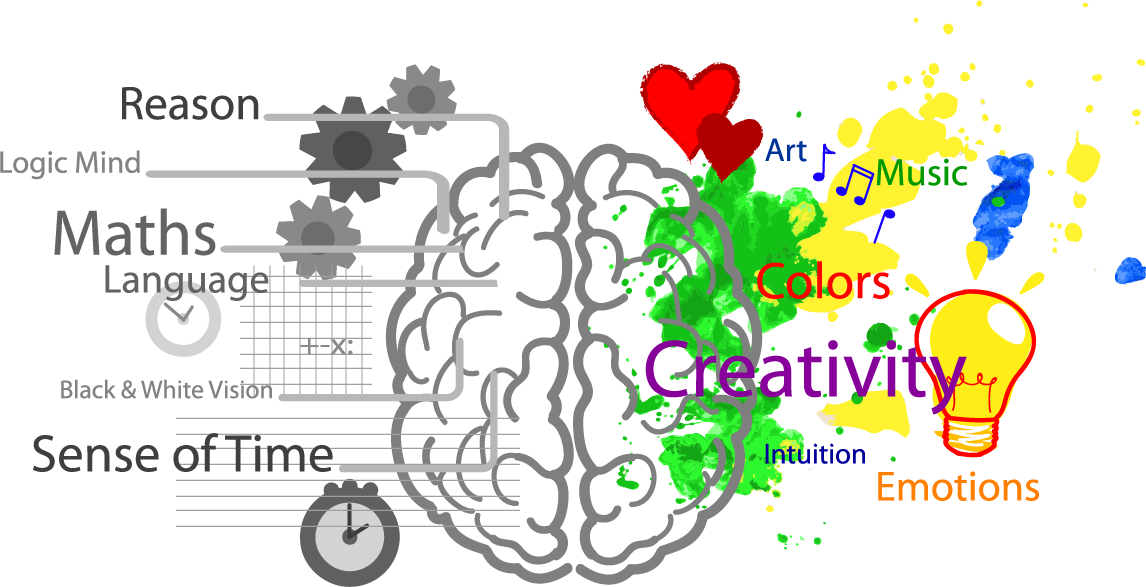
What you should know about how the human brain operates
Knowing how your brain works and how it consolidates memories will give you a better understanding of how to improve both short-term memory and long-term memory.
The human brain is an amazingly complex organ. It controls nearly all functions in the body, such as auditory processing, visual processing, sensation, memory, feelings, and emotions.
The brain consists of approximately one hundred billion nerve cells called neurons. What makes neurons special is their ability to gather and transmit messages with the help of electrochemical signals.
The structure of the neuron is quite complicated—it consists of a cell body, dendrites, and an axon, which also has a complex structure. Protein and fat are the building blocks of these branch-like parts and are essential for their work.
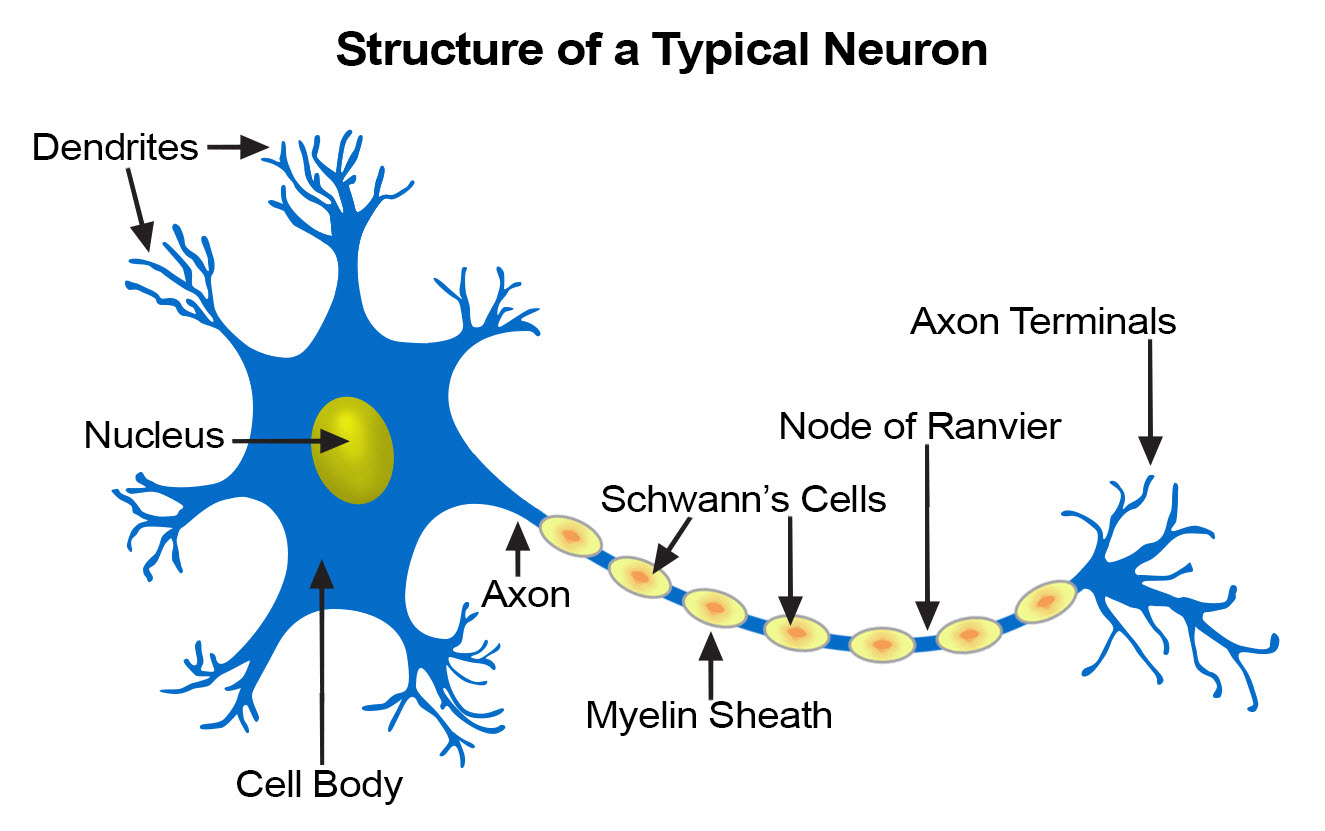
Whether it’s the smell of perfume or a new word in Italian, the process of remembering starts with perception.
This perceived information is encoded and registered with the help of chemicals, and electrical impulses sent between neurons. When an electrical impulse occurs between neighboring cells, chemical substances called neurotransmitters are released. As you receive new information, the connections between cells become stronger with the help of dendrites and complex chemical substances.
All of these memory-related processes require some basic building blocks—like different elements, proteins, amino acids, and fatty acids—to function properly. If their supply is sufficient, the memory process will occur according to plan. But if there is a shortage of these substances, mechanisms and steps in the memory process will break down and suffer damage.
Think about it this way. If you want to bake a tasty cake, you should have all of the ingredients in the correct amounts, right? If you’ve only got flour, you won’t end up with a cake.
How to improve your memory—the right diet will boost your chances!
So, how to improve memory strength?
Today, there are countless tips, methods, and memory exercises to help you make your brain work more efficiently and know how to improve memory power.
Getting the proper nutrition is one of the best memory-strengthening techniques. The right diet not only makes you healthier, fitter, and more attractive but, thanks to elements vital for brain function, it can also boost memory and concentration and enhance your attention span.
Everyone knows that physical activities are very tiring and energy-consuming. But intellectual activity demands a lot of energy as well, much more than you might think! Most people underestimate the importance of nutrition for your brain function.
Although the brain makes up only 20% of human body weight, it consumes around 20% of a person’s daily calorie intake.
When handling difficult intellectual tasks and memorizing a lot of information, it’s essential to provide the right nutrition for your brain to get the best result. What you eat greatly affects your brain function, memory, concentration, work capacity, and mood.
What are some foods that improve memory and help your brain function well?
The ultimate question is how to strengthen memory power by eating particular foods. To do this, you need to get the right amount of important nutrients.
Here are just a few examples:
Glucose is an essential substance that supplies your brain with energy.
Magnesium protects your brain from stress and aging.
Omega fatty acids are important building blocks of your brain and nerves.
Lecithin is a powerful antioxidant that protects brain cells and membranes from free radical damage.
Zinc is important for enzymatic reactions, as it modulates brain excitability. It’s also essential for the immune system.
Iron plays a part in the process of transmitting electronic impulses.
Iodine not only affects our brain function, but its deficiency can lead to IQ decline.
Vitamins form a separate group of compounds and should be present in foods to help you concentrate.
Keep reading to know more about how to increase memory with the help of different vitamins.
The best vitamins for your brain
Vitamin C is essential for the production of neurotransmitters, which impact our ability to concentrate, focus on specific tasks, and remember important data. It is one of the key brain power vitamins.
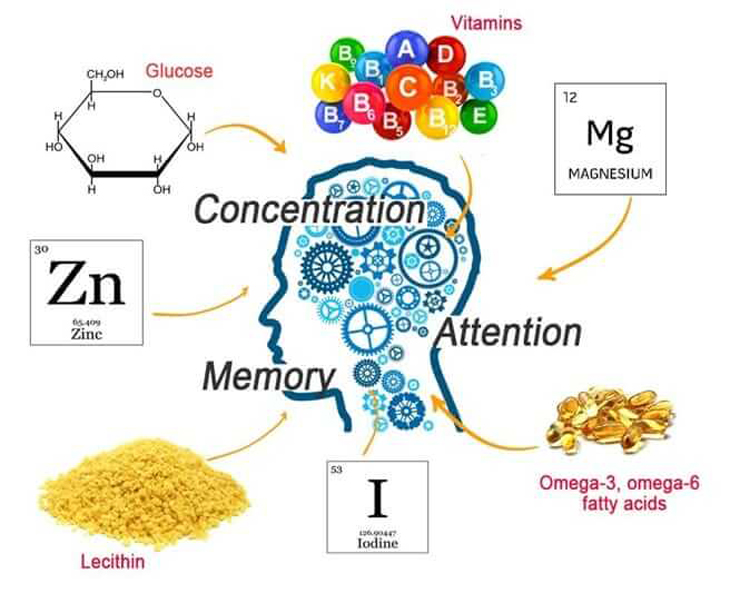
Vitamin B1 is responsible for storing information and for the carbohydrate exchange that releases the energy consumed by the brain.
Vitamin B3 (niacin) is responsible for supplying glucose. It is one of the vitamins that help you concentrate, so its deficiency can result in serious concentration disorders and memory loss.
Folic acid (B9) converts carbohydrates into glucose, which is vital for the production of energy for the brain.
Vitamin K is great for memory improvement too. This vitamin is extremely important for brain function, as its properties help fight Alzheimer’s disease and have anti-aging benefits.
See?
We’ve given you a comprehensive answer to the question, “How can I improve my memory?”
Six basic rules to remember about nutrition for your brain
- Drink enough clean water.
- Eat foods that contain natural carbohydrates such as grains, vegetables, and fruits.
- Include seafood such as fish, oysters, and shrimp in your diet, because they contain a lot if iodine and protein.
- Avoid sugars, highly processed foods, and refined foods. These foods do not contain nutrients good for the brain and can even have harmful effects on your metabolism.
- Take probiotics with healthy bacteria to contribute to good brain function.
- Give preference to food with brain power vitamins, such as B1, B9 (folic acid), C, and K.
Interested in other ways to improve memory?
Best foods to improve memory and boost your brain power
- Vegetables. Focus on those with high amounts of vitamin C, such as broccoli, Brussels sprouts, and cauliflower. Healthy for the whole body and especially for the brain, broccoli contains a lot of folic acid and vitamins B, C, and K. It improves the work of your nervous system, stimulates your brain, and reduces stress. It is also very good for your bones.
- Berries. Different kinds of berries are among the best foods to boost memory and concentration. If you want to know how to improve concentration, blueberries are one of the best foods for brain function. These berries protect your brain from stress and have antioxidants to improve your overall learning capacity.
- Salmon. Salmon is rich in omega-3 essential fatty acids, which contribute to brain health and brain function. Scientists recommend having salmon 3 to 4 times a week.
- Nuts and seeds. All nuts contribute to the enhancement of your attention span, memory, and brain health. They contain omega-3 and omega-6 fatty acids, along with vitamin E, vitamin B6, and magnesium. Walnuts, peanuts, Brazil nuts, filberts, hazelnuts, almonds, cashews, sesame seeds, sunflower seeds—eat any kind you like! You can eat both raw and roasted nuts.
- Garlic. With many healthful benefits, garlic helps increase memory, cognitive brain function, and longevity.
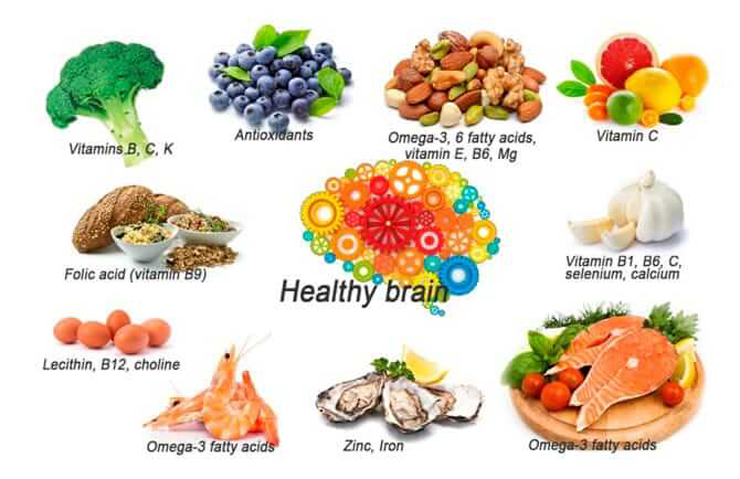
- Oysters. Oysters are highly beneficial for memory and concentration due to the large quantity of zinc and iron they contain.
- Whole grains. Because they are so rich in folic acid, it’s difficult to overestimate the importance of whole grain foods like wheat and bran for memory function. Whole grains are also extremely important for reproductive function.
- Eggs. Eggs are rich in lecithin, vitamin B12, and essential fatty acids. Egg yolks also contain choline, which is an essential building block of neurons.
- Seafood. Fish and shrimp contain large amounts of omega-3 fatty acids, which are important for brain cells and oxygen transport. These foods may also help prevent Alzheimer’s disease.
- Fruit. Eat fruitswith high amounts of vitamins—such as citrus fruits, mango, kiwi, watermelon, and strawberries—every day.
In this short video, you can quickly and easily learn about the top 5 foods that improve memory and are good for overall brain health.
Brain food for studying and exams
If you are a student who has to remember a ton of information, choose specific brain foods for studying that will help your brain work better under stress. The proper diet can make your studying much easier and more pleasant.
When preparing for exams and studying hard, plan your diet strategically to make sure it contains the necessary brain foods to enhance memory. Eating the right foods during exam time will reduce stress, help you concentrate, and keep you alert while studying and taking tests.
In general, you should eat the same brain foods to improve memory for studying as you would in your regular student life.
But for breakfast on exam day? For that ever-so-important meal, we have chosen some special foods.
Five simple tips on what to eat before an exam and how to improve working memory
- On exam day, avoid foods like cookies, cakes, chocolate, and candies, as they take a lot of time to digest and steal energy away from your brain.
- Avoid combining proteins with starches, as this combination can make you feel sleepy. For example, you might not want to eat steak and a heaping pile of French fries before an exam.
- Drink enough beverages that you avoid feeling thirsty, as your body shouldn’t be dehydrated. Clean water is always the best choice.
- Avoid sodas, sugary beverages, and coffee. Caffeine can make you feel nervous, which is highly undesirable during the exam.
- Include some protein in your breakfast, such as eggs, cottage cheese, or nuts. A possible full meal might be eggs and toast with cheese, whole-grain cereal with milk, porridge, muesli, or oatmeal. Add some honey to your porridge for a good source of glucose, which positively impacts brain activity and memory.
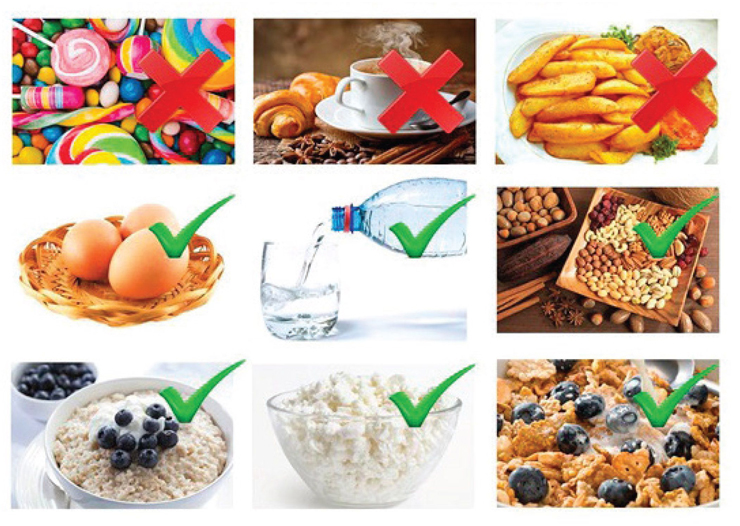
As you can see, proper nutrition plays an essential role in the development and improvement of your memory.
By following these simple dietary recommendations and choosing only healthy foods that are rich in vitamins and proteins, you’ll see results in the form of increased concentration, better memory, and improved mental and physical health.
With all these tips in hand, you’re the expert now! Be sure to share your knowledge of how to improve memory with your friends.




wow, I am so excited. you have just explained everything. I’m not going to fail again
Glad you liked the post, Ryan!
thank you very much for the article. I will definitely try the tips out
We’ve arrived at the end of the line and I have what I need!
Glad you found what you needed in my article! Come back for more, Latrice.
Next time I’ll try to use these tips preparing for my exams.
Hi Helen,
I am glad my post is useful for you and wish good luck in your future exams!
Keep me posted, subscribed. Thanks.
Hi Eddie Ng,
You can subscribe to our updates to receive new educational tips to your inbox.
Do you mind if I quote a couple of your articles as long as I provide credit and sources back to your website? My website is in the exact same area of interest as yours and my users would certainly benefit from some of the information you provide here. Please let me know if this ok with you. Thanks a lot!
Hi, Teige! Sure thing, we are glad that you liked our blog so much. Thank you for sharing!
Thank God and the writer. Is honey possible to use instead of sugar?
Hey there,
we’re happy to know that you found our article helpful!